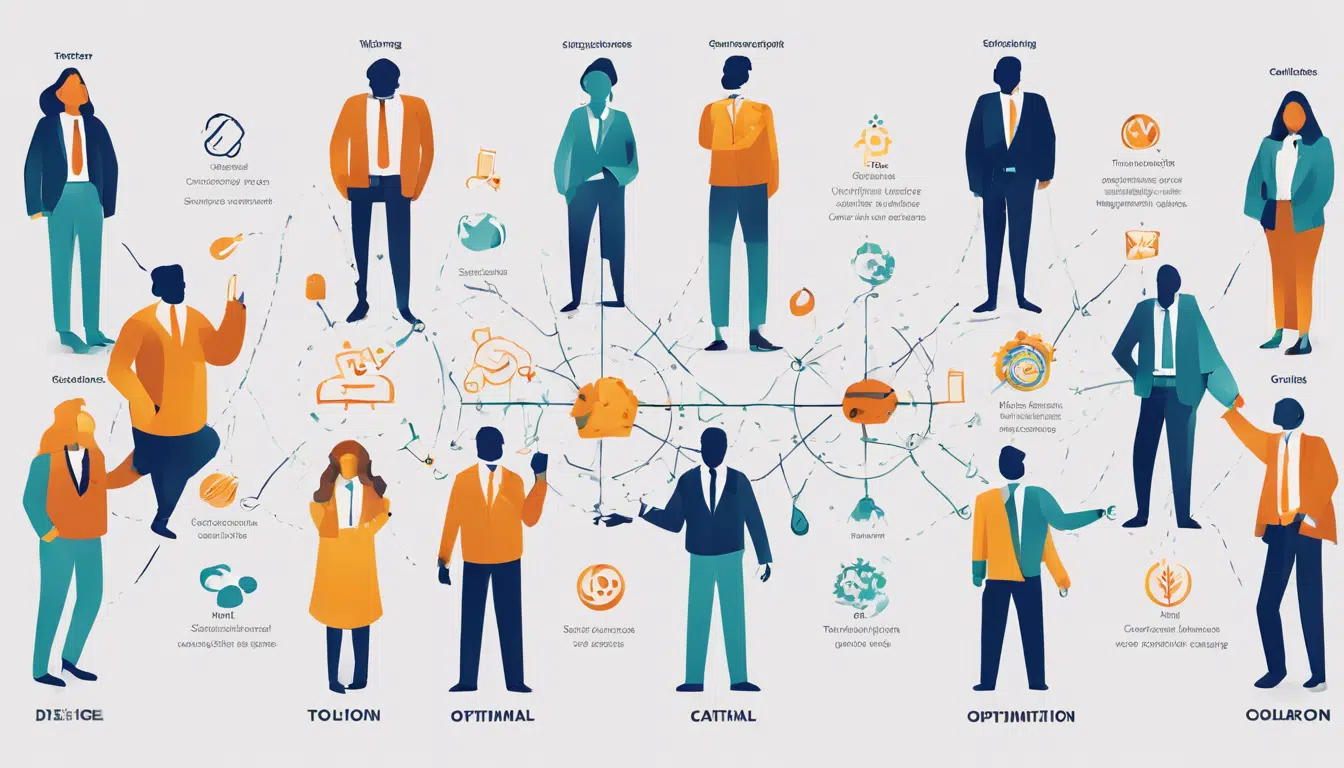You found our list of top qualities of successful teams.
The qualities of successful teams are the attributes and behaviors that foster effective collaboration and the achievement of group goals. For example, clear communication, trust among members, and strong leadership are crucial. These qualities enhance productivity, foster a positive work environment, and achieve desired outcomes. These traits are also known as “qualities of efficient teams” and “essentials of successful teams.”
These traits relate to team building training courses, leadership qualities, good leadership qualities, and leadership skills.

This list includes:
- qualities of efficient teams
- essentials of successful teams
- effective teamwork qualities
- features of successful teamwork
- top traits for teamwork
- successful team dynamics
Let’s get to it!
List of qualities of successful teams
From Clear Goals to Shared Vision, here is our list of the top traits for teamwork.
1. Clear Goals
Successful teams need clear goals to stay focused and work well together. Clear objectives help team members know what tasks to prioritize and make progress toward shared success. Reaching goals motivates the team and creates a positive work environment. When all team members understand the goals, teams can track progress and celebrate wins together. Clear goals also give the team a sense of purpose and help them work toward a common vision.
2. Role Clarity
Role clarity is critical for successful team dynamics. Clear roles are essential for successful teams because they help members understand their responsibilities and how they support team goals. When every team member knows their role, it reduces confusion and conflict, making it easier to work together. Clear roles also help with dividing tasks efficiently, boosting productivity and performance. Role delegation promotes accountability, as each teammate knows what is expected of them.
Get our free team building toolbox
- icebreaker games
- bingo cards
- DIY guides
 by teams at FedEx, Amazon, Deloitte and 73,930+ others
by teams at FedEx, Amazon, Deloitte and 73,930+ others

3. Strong Leadership
Leadership is key to team success. A leader motivates, guides, and inspires the team, which improves performance. Clear goals, good communication, and a positive work environment increase team engagement and productivity. Strong leaders also handle conflicts and keep the team focused on their goals. Leadership gives direction and support, helping the team work together to overcome challenges and reach excellent results. Leaders empower their team by encouraging them and setting a good example.
Learn more about leadership qualities.
4. Effective Communication
Effective communication is one of the essentials of successful teams. Clear and open communication helps team members stay on the same page, reducing misunderstandings and conflicts. When team members listen to each other and share ideas clearly, they can work together well toward common goals. Good communication builds trust, strengthens relationships, and improves teamwork. Communication is the foundation for solid teamwork and reaching results with clarity and unity.
Check out communication games.
5. Mutual Trust
Mutual trust is important for successful teams because it builds strong relationships and helps folks work together smoothly. Team members must trust each other’s skills and intentions to collaborate well. This trust leads to open communication, dependable work, and a supportive environment where employees feel valued. Teams with trust can handle challenges better and succeed together, showing how vital trust is for teamwork and reaching goals. This sentiment is one of the key features of successful teamwork.
Here are books on building trust.
6. Conflict Resolution
Resolving conflicts is vital for successful teams. Disagreements will arise in any group, so the skill to resolve conflicts is necessary. Successful conflict resolution includes listening actively, showing empathy, and being open to finding solutions that help all parties. By dealing with conflicts promptly and positively, teams can strengthen relationships and create a favorable work atmosphere. Improving conflict resolution skills can multiply teamwork, productivity, and team success in the future.
Learn more about conflict resolution activities.
7. Commitment
Commitment is one of the most effective teamwork qualities. Dedication is key for successful teams, which means staying focused on goals even when things get tough. Committed team members are reliable and get tasks done on time. When everyone is dedicated, teamwork and cooperation grow stronger. In short, dedication holds the team together and keeps them working toward shared goals.
8. Diverse Skills
Thriving teams succeed using different skills, each member bringing unique strengths. This mix helps teams solve problems in new ways and find better solutions. Team members achieve better results by supporting each other’s strengths and weaknesses. Embracing different skills also promotes learning as team members share their knowledge.
Learn more about collaboration skills.
9. Adaptability
Adaptability is one of the most important qualities of efficient teams. Successful teams need adaptability to quickly adjust to changes and handle challenges with resilience and creativity in fast-paced environments. Adaptability helps teams deal with uncertainty, find new solutions, and build a work culture supporting learning and trying new things. Staying open to change allows teams to respond to trends, improve strategies, and succeed in a constantly changing business world.
10. Positive Culture
A positive team culture breeds success. When team members have a good attitude toward their work and each other, it creates a supportive environment where everyone can do their best. This atmosphere leads to better communication, teamwork, and productivity. Celebrating successes, recognizing effort, and giving helpful feedback are essential for keeping a positive culture. Building positivity boosts motivation and morale, leading to better results over time.
Check out these examples of strong work cultures.
11. Performance Metrics
Teams need to track progress and measure success using performance metrics. These key indicators help set goals, check how well the team is doing, and make intelligent decisions. Knowing the value of these metrics helps teams work better, stay focused on goals, and keep improving. Regularly tracking metrics helps teams quickly adapt, solve problems, and take advantage of growth opportunities. Using performance data well helps teams grow and succeed in the long run.
12. Shared Vision
A shared vision is key for successful teams. When all team members understand and work toward the same goals, the team stays united and achieves much better results. This focus on common goals boosts efficiency and productivity. A shared vision also helps the team face challenges together and celebrate successes.
Final Thoughts
Knowing what makes teams successful helps organizations build better teamwork. By focusing on these traits, teams can thrive. Achieving these qualities takes effort and commitment from everyone on the team. Leaders must create an environment where these qualities can grow.
Next, check out our posts on management skills, good leaders, collaboration skills, TED talks for team building, and team player characteristics.



